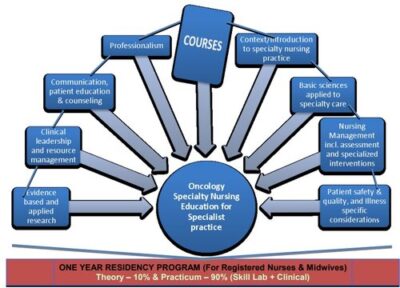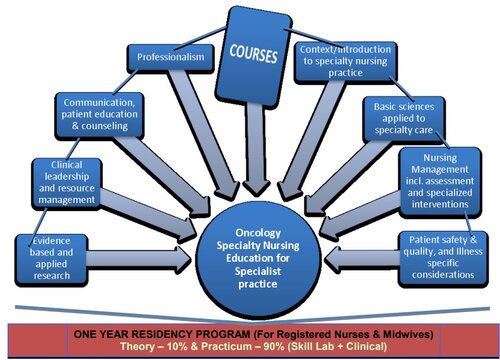Post Basic Diploma in Oncology Specialty Nursing – Residency Program, Regulations, 2020: Indian Nursing Council
INDIAN NURSING COUNCIL
NOTIFICATION
New Delhi, the 22nd February, 2021
F. No. 11-1/2019-INC.—In exercise of the powers conferred by sub-section (1) of Section 16 of Indian Nursing Council Act, 1947 (XLVIII of 1947), as amended from time to time, the Indian Nursing Council hereby makes the following regulations, namely:—
1. Short Title and Commencement
- These Regulations may be called Indian Nursing Council (Post Basic Diploma in Oncology Specialty Nursing – Residency Program), Regulations, 2020.
- These Regulations shall come into force on the date of notification of the same in the Official
Gazette of India.
2. Definitions
In these Regulations, unless the context otherwise requires,
- ‘the Act’ means the Indian Nursing Council Act, 1947 (XLVIII of 1947) as amended from time to time;
- ‘the Council’ means the Indian Nursing Council constituted under the Act;
- ‘SNRC’ means the State Nurse and Midwives Registration Council, by whichever name constituted, by the respective State Governments;
- ‘RN & RM’ means a Registered Nurse and Registered Midwife (RN & RM) and denotes a nurse who has completed successfully, recognised Bachelor of Nursing (B.Sc. Nursing) or Diploma in General Nursing and Midwifery (GNM) course, as prescribed by the Council and is registered in a SNRC as Registered Nurse and Registered Midwife;
- ‘Nurses Registration & Tracking System (NRTS)’ means a system developed by Indian Nursing Council and software developed in association with National Informatics Centre (NIC), Government of India, and hosted by NIC for the purpose of maintenance and operation of the Indian Nurses Register. It has standardised forms for collection of the data of Registered Nurse and Registered Midwife (RN&RM)/Registered Auxiliary Nurse Midwife (RANM)/Registered Lady Health Visitor (RLHV) upon Aadhar based biometric authentication;
- ‘NUID’ is the Nurses Unique Identification Number given to the registrants in the NRTS system;
- ‘General Nursing and Midwifery (GNM)’ means Diploma in General Nursing and Midwifery qualification recognized by the Council under Section 10 of the Act and included in Part-I of the Schedule of the Act.
POST BASIC DIPLOMA IN ONCOLOGY SPECIALTY NURSING – RESIDENCY PROGRAM 2020
I. INTRODUCTION
Cancer is a major health problem worldwide and significant cause of mortality and morbidity in all age groups. Cancer prevention and treatment is one of the national health priorities. Developments in scientific knowledge and advances in technology coupled with increased patient knowledge about their disease and its treatment have led to an increase in public’s expectation in relation to cancer care.
Oncology nursing practice is characterized by dynamic and highly complex care and it encompasses preventive, promotive, curative, and palliative care for the patients. The severe and recurrent nature of cancer, coupled with the devastating effects of the diagnosis of cancer on patients and their families and the intensive treatment with chemotherapy, radiotherapy and/or immune suppressive medications leads to complex situations necessitating timely interventions.
The National Health Policy document (NHP, 2017) emphasizes the need to expand tertiary care services, prepare specialist nurses and standardization of clinical training for nurses. Responding to this, the Council planned to redesign the existing specialty nursing programs making it as a one-year post basic diploma residency programs utilizing competency-based training approach. The existing one-year Post Basic Diploma in Oncology Nursing of the Council is being reframed as a residency program using revised guidelines that aim to prepare specialist nurses who can provide competent care to cancer patients, whose diagnostic, treatment and care needs are complex and intensive.
II. PHILOSOPHY
The Council believes that registered nurses who are only generalists need to be further trained as specialist nurses to function in various emerging speciality areas of practice and the training should be competency based. One such area that demands specialist nurses is Oncology Nursing. Expanding roles of nurses and advances in Oncology and technology necessitates additional training to prepare nurses with specialized skills, knowledge and attitude to deliver competent, intelligent and appropriate care to patients with cancer.
III. CURRICULAR FRAMEWORK
The Post Basic Diploma in Oncology Specialty Nursing education is a one-year residency program and its curriculum is conceptualized encompassing foundational short courses and major specialty courses for specialty nursing practice.
The foundations to Oncology Nursing practice such as Professionalism, Communication & patient
education, Clinical leadership & resource management, and Evidence based & applied research are short courses that aim to provide the students with the knowledge, attitude and competencies essential to function as accountable, sincere, safe and competent specialist nurses. The major specialty courses are organized under Oncology Specialty Nursing-I and Oncology Specialty Nursing-II.
Oncology Specialty Nursing-I includes Context/Introduction to Oncology Nursing, and Basic Sciences applied to Oncology Nursing (application of basic science knowledge in the diagnosis, treatment and care of clinical conditions under Oncology Specialty Nursing). Specialty Nursing-II includes nursing management of patients with cancer comprising assessment, diagnosis, treatment and specialized interventions and patient safety & quality including illness specific considerations. The curricular framework is illustrated in the following figure-1.
POST BASIC DIPLOMA IN ONCOLOGY SPECIALTY NURSING – RESIDENCY PROGRAM
Foundations to Oncology Nursing – Courses Specialty (Oncology) Nursing – Courses

Figure 1. Curricular Framework for Oncology Specialty Nursing – Residency Program


COMMENTS